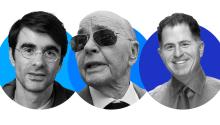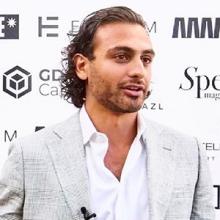Fit for a King: the UK multi entrepreneurial family behind International Group
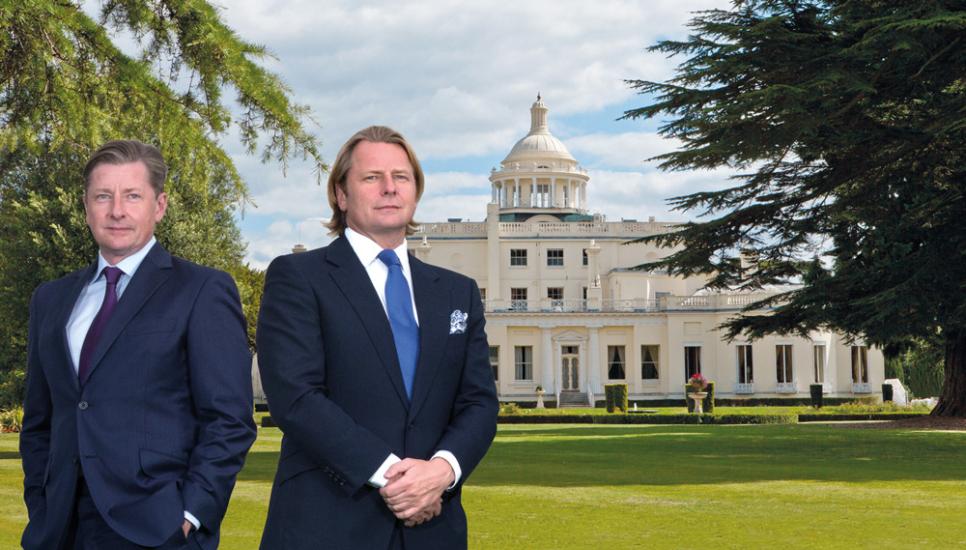
It's one of the most iconic scenes in cinema history, whose setting has barely changed. Sean Connery's James Bond is playing golf with villain Auric Goldfinger in the 1964 classic Goldfinger on a beautifully manicured course, when Bond catches him cheating. In retaliation for Bond switching balls on his opponent, Goldfinger motions to Oddjob, his deadly Korean manservant and caddie, to sever the head of a nearby statue with his steel-rimmed bowler. Bond wonders what the club secretary will have to say. Goldfinger explains smugly, “Oh nothing Mister Bond - I own the club!” Goldfinger as owner is make-believe, but the setting – Stoke Park in Buckinghamshire, England - looks exactly the same 50 years on. The scene is just one of many well-known films set at the 300-acre estate and country club (see box-out on page 20) that has been owned by second-generation UK family business, International Group (IG), since 1988.
For a family business with links to so much movie history and an expanding international footprint, the UK's King family has got there by doing things differently.
“A lot of founders … only have one business and so they're committed to that because they've been in it for many generations. Whereas our business is to stay in business and we don't necessarily care what the business is,” eldest son Hertford told PwC in an interview last year.
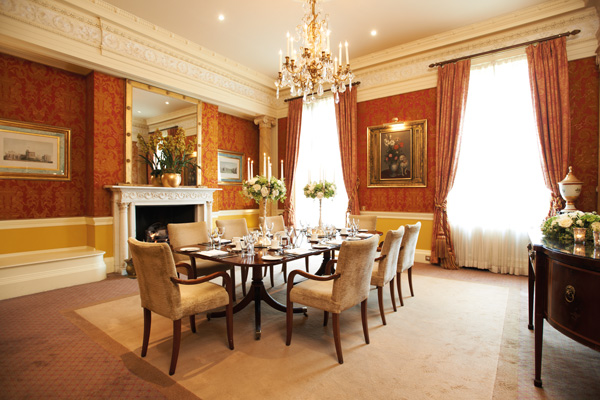 Where many family businesses establish themselves locally, in one sector and largely stick to what they know until they're ready to jump geographies or sectors, the King family have always been mavericks – taking a consciously unconventional path. They've had an international strategy from day one, (“We've done more business outside the UK than in the UK, so we always had that concept of international,” says youngest brother, Chester). They are spread across six different sectors from luxury and leisure to healthcare, and operate in countries from Ghana to China. They host some of the world's biggest names at Stoke Park, from tennis stars Novak Djokovic and Andy Murray (at Wimbledon warm-up tournament The Boodles) and Elton John (a charity event at Stoke Park raised $1.24 million) to footballing greats at Wembley Stadium, but maintain a low public profile – preferring 'white-label' projects to ones that bear their family name.
Where many family businesses establish themselves locally, in one sector and largely stick to what they know until they're ready to jump geographies or sectors, the King family have always been mavericks – taking a consciously unconventional path. They've had an international strategy from day one, (“We've done more business outside the UK than in the UK, so we always had that concept of international,” says youngest brother, Chester). They are spread across six different sectors from luxury and leisure to healthcare, and operate in countries from Ghana to China. They host some of the world's biggest names at Stoke Park, from tennis stars Novak Djokovic and Andy Murray (at Wimbledon warm-up tournament The Boodles) and Elton John (a charity event at Stoke Park raised $1.24 million) to footballing greats at Wembley Stadium, but maintain a low public profile – preferring 'white-label' projects to ones that bear their family name.
So what's the driving force behind this amalgam of operating businesses?
Run by three brothers, Hertford (49), Witney (48), and Chester (44), International Group's maverick approach is principally down to its founder Roger King, who set it up in the UK in 1964.
“My father has always been optimistic, it's all about the business,” says Chester. A consummate dealmaker, King started out as a jeweller, who went on to become the world wide distributor for the Soviet Union's polished diamonds. Then, thanks to a series of meetings over a London property deal with a member of the Abu Dhabi Royal family, Sheik Suroor bin Mohammed Al Nahyan, he moved into running hospitals in Abu Dhabi and Saudi Arabia in the late 1970s.
International Hospitals Group (IHG) was born and has since completed over 450 projects in 49 countries around the world for private and public sector clients, including 22 national governments, the United Nations, the World Bank, and the International Monetary Fund.
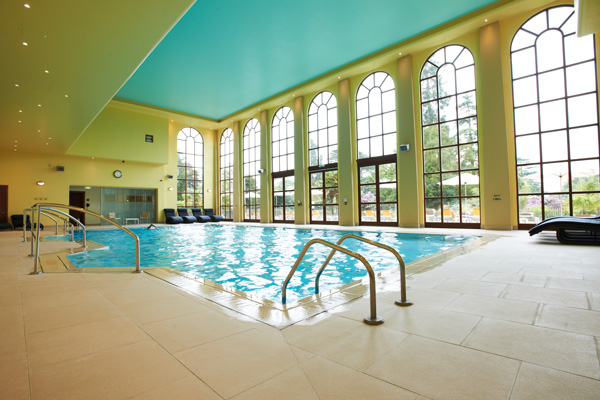 Today IG is spread across six business lines, with the three lynchpins being Stoke Park, International Group Management (IGM), and IHG.
Today IG is spread across six business lines, with the three lynchpins being Stoke Park, International Group Management (IGM), and IHG.
Annual revenues can fluctuate from £30 million to £100 million ($45 million to $150 million) each year, depending on the payment terms of their multi-year contracts, with total revenue of around £3.5 billon in the past 30 years. Revenues are increasing 5-10% per year.
This range of business interests has provided fertile management opportunities for the three brothers.
“The environment we were brought up in was one of incredible optimism, where anything is possible, you can just do it. That was a brilliant approach, which we all assumed was the norm,” says Chester.
Roger King's attitude has fostered a unique relationship with his sons – so often a source of friction in family businesses.
“A lot of my friends' dads were competitive and used to try to beat their children at tennis or golf. Whereas we never had that environment, we're a team and we look after each other. We weren't brought up to compete against our siblings. We have always had a solid relationship because we're brought up as a unit and we're not trying to outdo each other,” Chester adds.
What then is the common bond between all these seemingly disparate businesses?
“We sell 'advanced management processes and an understanding of how to reach the markets our clients need', and that's our key. With our experience and breadth of knowledge, we can look at almost anything. The Bobby Moore Club at Wembley Stadium, London is home to the biggest restaurant in Europe, which could scare the hell out of a lot of people, but we know how to structure it and run it because we do events,” says Chester.
“We were also brought up to be low-key and conservative as individuals. It's not about the King brand, it's about our companies or our clients' brands,” he adds.
Apart from Hertford, who worked as a management consultant at KPMG for three years, all three brothers have worked in the family business since leaving university and each held a 10% stake, until recently.
“When we were younger we used to start rotating running different businesses with two to three years in each division. That was really good because it gave us a broad understanding of the businesses,” Chester explains. In the past six years their roles have solidified with Hertford as chief executive of International Group overseeing core functions like IT, finance and legal, and focusing on China; Witney focusing on risk management and procurement, and running the healthcare division, and Chester, in charge of marketing and heading its leisure business. Roger still maintains a day-to-day role as chairman but recently changed from holding a 70% stake of the business, to an equal holding of 25% for himself and his three sons.
Equality is a theme that's deeply ingrained in the family. All three brothers are paid the same and they even live near one another on the same farm, about half an hour's drive from Stoke Park.
“We don't do dividends, we just get paid the minimum salary we need because we're always reinvesting in the business,” says Chester. “It's a clever strategy of my father. You've got to keep working and earning otherwise you can't retire!”
 International Group's most public 'jewel' is Stoke Park. Its cinematic history extends from that Bond scene to the present day where it's been used for other iconic British films including Tomorrow Never Dies (1997), Bridget Jones's Diary (2001) and Layer Cake (2004) – although the estate's history stretches back a thousand years.
International Group's most public 'jewel' is Stoke Park. Its cinematic history extends from that Bond scene to the present day where it's been used for other iconic British films including Tomorrow Never Dies (1997), Bridget Jones's Diary (2001) and Layer Cake (2004) – although the estate's history stretches back a thousand years.
The Mansion house designed by James Wyatt in 1288 sits in a regal position with sweeping views across parkland - the product of two masterminds of eighteenth century landscape architecture, Lancelot “Capability” Brown and Humphry Repton, who designed the landscape in 1792. It also has picture postcard views across the Repton Bridge and 'Capability' Brown lakes o St Giles' Church.
Only 20 minutes from Heathrow and 40 minutes from Central London, Stoke Park has staked its claim as the UK's leading country club, spa, and hotel with a '5 AA Red Star Hotel' and earlier this year won 'The Ultimate Members Club 2015' award, known as the Oscars of the golfing industry. Its 27 hole Championship golf course beat Wentworth Club, Emirates Golf Club, and Dubai Creek to win the prestigious award. Each year it hosts the pre-Wimbledon tennis tournament The Boodles – which is due to celebrate its 15th year in 2016.
It has traditionally been perceived as more of a private country club and has sought in recent years to raise its profile as a hotel and spa destination, according to Fiona Duncan – a hotel industry expert and Daily Telegraph columnist.
Chester says its appeal lies in its facilities and proximity to London. “You don't have to go up to Scotland or down to Devon for golfing on the weekends, you can drive 40 minutes out from Notting Hill, west London and you can have it all here in southern England.”
Having invested about £40 million restoring Stoke Park since the 1980s, the Kings now have ambitions to extend the brand both in the UK and in China.
The first stage is to build a new business at Stoke Park with the first residential development within the estate itself. It has planning approval for a unique development called “The8” (four houses and four apartments) overlooking the historic parkland and golf course - construction is due to start next year. The residential development will feature world class, modern design by leading architects WATG and interiors by Katherine Pooley. The8 have been designed to appeal to Londoners seeking a slice of country living with the facilities and services of a luxury club and resort, international owners, and actors looking for a more permanent base while they film at nearby Pinewood Studios where the Star Wars and James Bond films are produced.
“We're exporting the Stoke Park brand. In China we're doing an equine country club and they want Stoke Park as a brand name,” says Chester.
He is also excited about the possibilities offered by Zhejiang Circuit. Due to open in September 2016, the circuit will be the leading motorsport destination in China. Situated 90 minutes south of Shanghai, IGM has a 20-year operational contract to manage its 52-bedroom luxury hotel, spa and wellness facility, a luxury clubhouse, and a 6,000-person grandstand.
“It's a bit like a golf resort,” explains Chester. “You [become a member of the motor racing resort] and come out with three or four friends to drive your cars. We also have our own track cars, as well, that you can learn in to improve your driving.”
It will also cater for corporate clients, for example Porsche who might invite 20 clients down to the private circuit when they launch a new car. The project is backed by 29-year-old owner and local entrepreneur, Kevin Jiang, himself a car fanatic, and is forecast to generate joining fees of circa £35 million.
The motor racing resort is just the latest project for IGM which provides 'advanced management and marketing' solutions and reduces risk for developers of high quality sports stadia and venues, lifestyle, city centre, and sporting members' clubs, spas, and luxury hotels. Its clients have included Alfred Dunhill and Jaguar Land Rover, with its most high-profile venture being membership sales and operational management for the Bobby Moore Club at Wembley Stadium – the home of English football. There IGM manages 1,900 half-way line seats and its adjoining private restaurant (“the largest in Europe”, says Chester) and helped secure in excess of £135 million of revenue through sales of 10-year memberships.
A 2014 PwC report found many family businesses lacked the skills or confidence to break into entirely new regions, despite three-quarters of family enterprises expecting to be exporting within five years. What's helped International Group gain a foothold in countries as diverse as Vietnam to Botswana?
Hertford says they've benefited from great support from British Government agencies such as UK Trade & Investment, Healthcare UK, and British embassies abroad. Hertford was one of 25 business leaders, including former Barclays CEO Bob Diamond, who accompanied UK Prime Minister David Cameron as part of an African business delegation in 2011.
“One of our core business principles is that we do what we say we are going to do,” echoes Chester. “We've completed every single contract, albeit it might take time to get paid and things might get put on hold because of an election, for example. But I think that's why the UK Government support us - they know by hook or by crook we'll get it done. And that's an important piece of advice - if you do go international you've got to be prepared to commit senior management, be in it for the long term, build relationships, and always deliver.”
International Group has also been helped by corporate introductions.
Hertford participated in the inaugural UK/China CEO Dialogue in Beijing in November 2013 - a “corporate matchmaking programme” platform that PwC established in conjunction with Huiyuan chairman Zhu Xinli to bring UK and China businesses together. Huiyuan is the largest soft drink manufacturer in China. Hertford's experience was so positive that he offered to host a UK-based event at Stoke Park last spring.
Suwei Jiang, a partner in PwC's China Business Group, helped set up the UK/China CEO Dialogue and has assisted IHG to expand its business in China.
“That deep-rooted entrepreneurialism in the King family is one of the key factors for their success in China. The way they operate as a business, and as a family, is more aligned to the Chinese way of doing business,” she notes.
%2C-Witney-King%2C-and-Chester-King.jpg) Jiang says the King family (pictured left with London mayor Boris Johnson) share many of the values that are important to first generation, entrepreneurial Chinese chiefly: trust established through personal bonds. “A lot of business is done based on personal trust. What will keep the businesses together is the bond between the owners, rather than a contract on a piece of paper.”
Jiang says the King family (pictured left with London mayor Boris Johnson) share many of the values that are important to first generation, entrepreneurial Chinese chiefly: trust established through personal bonds. “A lot of business is done based on personal trust. What will keep the businesses together is the bond between the owners, rather than a contract on a piece of paper.”
“There are a lot of opportunities for family businesses in China. But many family businesses have not yet made the step,” cautions Jiang, with staff resources being one of the main business constraints.
“Because it is a close-knit management team, you don't necessarily have the bandwidth to take on the projects,” she warns.
Is reputational or operational risk in operating internationally another big danger family businesses need to look out for, particularly in riskier frontier markets?
IHG, in particular, has to be very transparent in the way that it deals with national governments. In 2004 the hospitals group was sucked into a political tussle over the management of Nigeria's National Hospital in Abuja.
Chester acknowledges that dealing with heightened perceived levels of risk is what has set IG apart in the past. It operated in Libya before the 2011 crisis, went back after the revolution, but closed its operations again about 18 months ago.
“Last time I was in Libya, I was woken up by a bomb outside my hotel and I thought 'time to go',” Chester recalls.
He emphasises that patience is an important commodity, especially when businesses are looking to expand into China.
“I think if you have the concept that you're going to try 'cracking' a country, then you've got to be prepared to do the time. In China, it's friends first, business second. Some people might say 'we're not doing that; we're not going to try that because we don't get an instant return'. So I think we're slightly lucky that we're not trying to make a penny or a dollar out of everything.”
This patient capital approach influences their approach to succession. Despite all three brothers being in their 40s, the future for the third generation (aged from a 15 to a five-year-old) is already being considered.
“I have this analogy of a conveyer belt. I'm not trying to build up a business, cash out and have money for me, because what would I do with the money? To me it's about providing career opportunities for the next generation who will hopefully come into the business,” he says. “It is definitely about the journey and not the destination”.
Doesn't this ever-growing number of countries the family is operating in make it difficult to communicate, from day-to-day issues to more strategic issues – like succession?
“It depends. We communicate daily, mainly via email and phone calls. But meeting wise, we'll have a structured meeting once a month where we look at cash flow and accounts,” says Chester. “Depending on what projects we're doing, I'll meet Hertford more than Dad and Witney purely because we work together on our China businesses.”
Alongside its residential development at Stoke Park, China is its major strategic focus. This has been given added impetus by a recent announcement that, in addition to its joint venture with China National Railway to develop two major hospital projects in China, IHG has signed a long-term partnership with Wanda Group. China's largest commercial property company is owned by Wang Jianlin – one of China's wealthiest business titans.
With IHG's support, Wanda Group will build, equip, and commission a new 200-bed international standard hospital in Qingdao, Eastern China over the next three years. IHG will then take possession of the hospital in 2018 and manage it on a 20-year lease under its IHG Chinese brand until 2038. This is the first of several projects in the Wanda pipeline that IHG will be supporting over the next 10 years.
“We have had a great year in China. We have been very fortunate to start this new chapter in the company's history with a great local partner and one of the leading companies in China,” Hertford said at the announcement of the 23-year partnership.
Although the Kings started out as mavericks – their involvement with one of China's biggest entrepreneurs signals there's method in their madness. IG has found success operating in an unconventional way in markets where many others fear to tread. An approach that another British export, James Bond, would no doubt raise a glass (of Martini) to.


